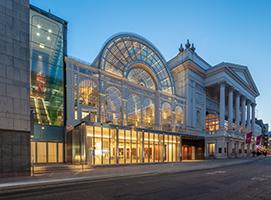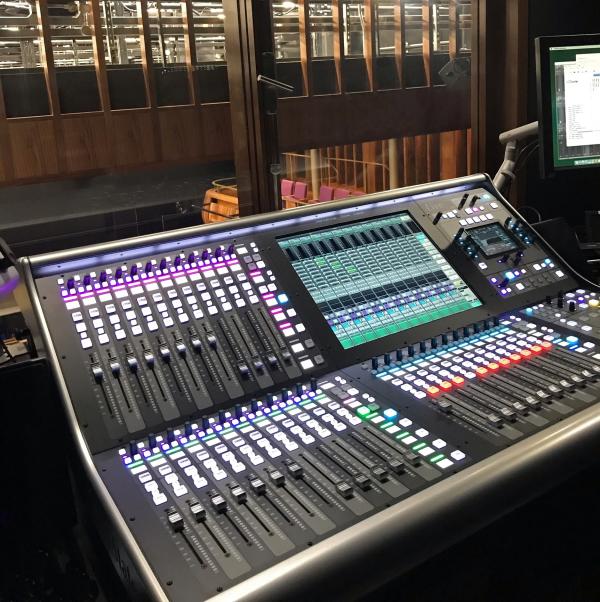LONDON, ENGLAND - Royal Opera House (ROH) , set in the heart of Covent Garden, is one of the most revered Opera Houses in the world. It is home to two of the world's finest artistic companies: The Royal Opera, and The Royal Ballet, both of which have been striving to break new ground in the world of lyric theatre since their inception. Its history speaks for itself, but the ROH team today is also very forward-thinking, and technology-driven.
Following at £50m refurbishment as part of the Open Up project to make the building more welcoming with new cafes, restaurants, shop and a newly refashioned Linbury Theatre, the west ends newest most intimate theatre. The Linbury Theatre presents chamber work for opera and dance as well as live orchestral performances. The ROH also has a thriving immersive live to cinema department, and a broadcast team. To make workflow as flexible, and as smooth as possible, Martin Adams, and the in-house technical team have upgraded the space, deploying an SSL L500 Plus console at the heart, with a Dante AoIP infrastructure.
From the initial audio makeover discussions for the Linbury Theatre, the idea of a Dante solution really appealed to Martin Adams and his team, and that got them thinking about which console to go for.
“The fact that a Dante infrastructure is built directly into the SSL L500 Plus was very interesting to us,” Adams explains. “It's the AoIP that you want: firstly, not to intrude on how you work; and secondly, once you have done an initial setup, you've kind of done the work, and everything else becomes easier. This also means making the system larger becomes very simple in the future. If you're in a rush - as we are, because we're working on really quick turnovers - people expect things here and now. One of Dante's joys is that it's based on a theory that audio is a plug and play thing; if you step back to analogue world, when you plug a stage box in, you plug a stage box in, and that's how you want it to operate.”
Adams says one of the great things about having the L500 Plus is that because it's great from a compositional perspective.
“Audio for us in the ROH is not a form of amplification, it's a compositional tool. A composer comes in and looks at the audio system exactly like that and that sets us apart from how people use audio in theatrical spaces; the console becomes part of the artistic input of the show.”
Another reason Adams wanted to go with an SSL system was the quality of audio.
“At this level, the sonics are very, very important; and when listening to the L500 Plus against other devices, there was simply no contest,” he insists. “We had already looked at the usability of the system, and how well it operated with Dante – that was a real positive - but when you actually listen to it – well, we were entirely sold.”
The shows in the Linbury Theatre are quite varied: they might run two-channel playback with Q-Lab on one day and have a 20-piece orchestra to contend with the next, often with a 60-piece virtual orchestra behind it. This is where the L500's stem architecture comes in particularly handy.
“We really love that about the SSL; we operate it when we do high channel count shows. Controlling 100-plus inputs can quickly become confusing, but using the stem architecture, you can break down an orchestra very nicely, and very simply, in a live environment. Before, we'd have matrixes going all over the place, but working this way frees you up to send your string section down to a fader; and you can fold that in and out as you want. It feels like you're in a studio! The sound we are getting is just phenomenal, so live orchestra mixing into this space via a multitrack sounds incredible. The audience members come up and tell us how good it sounds – in fact, they even do that after our live to cinema shows!”
The fact that a Dante infrastructure is built directly into the SSL L500 Plus was very interesting to us,” Adams explains. “It's the AoIP that you want: firstly, not to intrude on how you work; and secondly, once you have done an initial setup, you've kind of done the work, and everything else becomes easier. This also means making the system larger becomes very simple in the future. If you're in a rush - as we are, because we're working on really quick turnovers - people expect things here and now. One of Dante's joys is that it's based on a theory that audio is a plug and play thing; if you step back to analogue world, when you plug a stage box in, you plug a stage box in, and that's how you want it to operate.
The Royal Opera House live to cinema department has been running for 10 years now, and it's absolutely thriving; the L500 Plus is lending more than a helping hand in this area, too.
“It's all pre-mixed, and we do a lot of live streaming - so the stem architecture helps massively there,” Adams says. “Currently, we mix it down to 60 amplifier outputs going to various areas within the space. We have 200-plus speakers, including the delays and surrounds, so having the stems, and the flexibility in the desk to sub-mix across the whole theatre, has been great. And because of the way the SSL works, it means every production we do, we can record to multitrack, and send to our broadcast suite; again, the SSL is part of all of our thinking from that perspective, as it lends itself to doing it so simply.
“We have 256 channels, and then 32 from the desk, as well; and they are constantly shared with the broadcast department. Because we have Dante, our broadcast side subscribes when it wants to, and because the SSL is set up to share channels, the desk never sees it. It just happens in the background. That is brilliant. Having something so feature-rich that aids us, and makes those things so straightforward, is so good. It has all the functionality and flexibility in such a user-friendly package.”
As the L500 Plus has made such an impact, Adams is very keen to expand the system further:
“We are already looking to buy the smaller SSL L100 console to use as a remote surface, because we have many shows coming up with live orchestra mixing, and although we'd like to be able to do all the production with the larger console in the auditorium - we don't want to lose many seats.”



 VIEW MEDIA
VIEW MEDIA